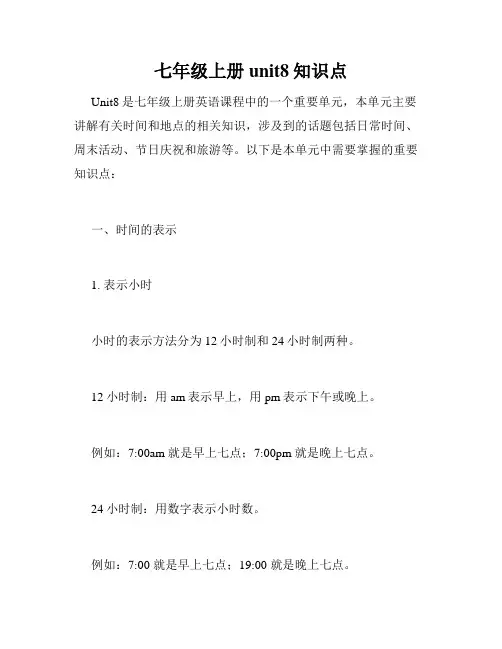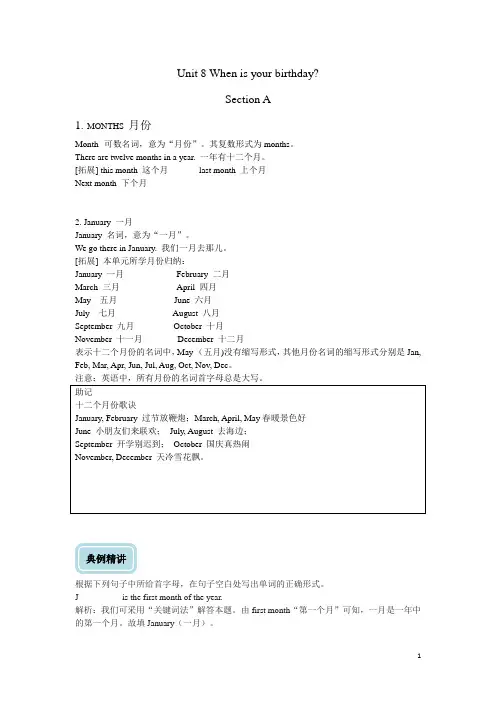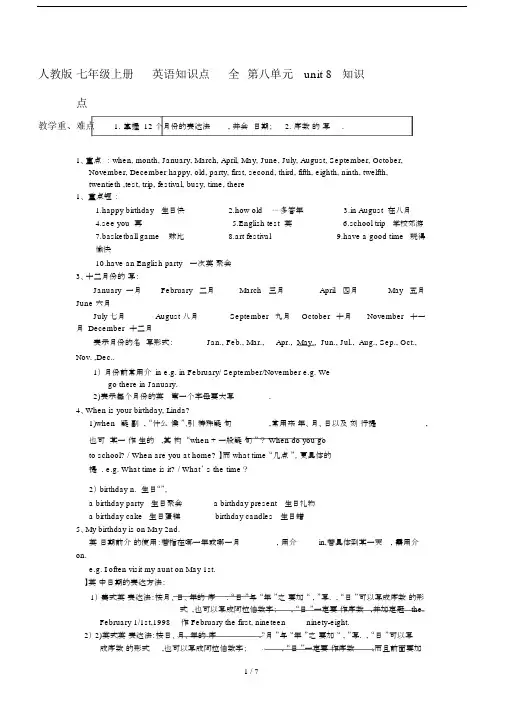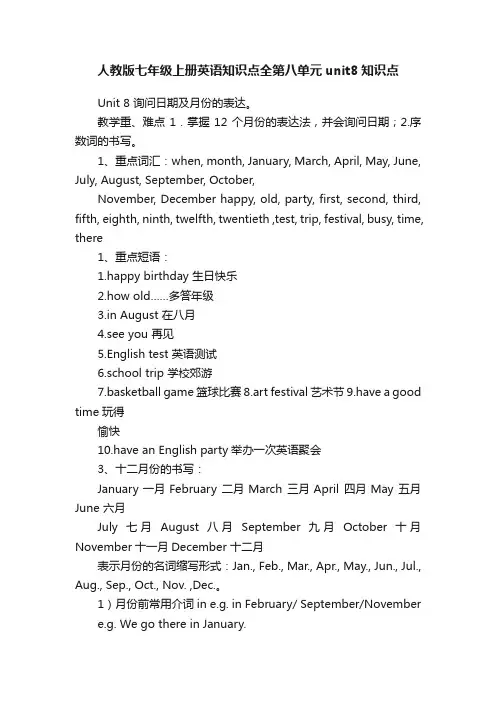人教版,七年级上册,英语知识点全,第八单元-unit-8-知识点,精品系列
- 格式:doc
- 大小:72.00 KB
- 文档页数:7

七年级上册unit8知识点Unit8是七年级上册英语课程中的一个重要单元,本单元主要讲解有关时间和地点的相关知识,涉及到的话题包括日常时间、周末活动、节日庆祝和旅游等。
以下是本单元中需要掌握的重要知识点:一、时间的表示1. 表示小时小时的表示方法分为12小时制和24小时制两种。
12小时制:用am表示早上,用pm表示下午或晚上。
例如:7:00am 就是早上七点;7:00pm 就是晚上七点。
24小时制:用数字表示小时数。
例如:7:00 就是早上七点;19:00 就是晚上七点。
2. 表示分钟分钟的表示方法是用“分”来表示。
例如:7:15 表示早上七点十五分;7:30 表示早上七点半。
3. 表示时间段英语中常用一些词语来表示时间段,比如morning、afternoon、evening和night等。
其中morning表示早上,afternoon表示下午,evening表示傍晚,night表示晚上。
二、地点的表示1. 表示位置英语中表示位置时可以用介词in、on和at,表示不同位置关系。
in表示在某个范围内,表示在房间、城市等内。
on表示在平面上,表示在桌子、地图等面上。
at表示在某个点上,较为具体,表示在门口、公园门口等位置。
例如:I am in the classroom;The book is on the table;I am atthe park gate。
2. 表示方向表示方向时可以使用一些词汇,比如:go straight、turnleft/right等。
例如:Go straight ahead and turn left at the traffic lights。
三、活动的表示1. 表示周末活动周末活动的表示方法主要是用动词,比如play、watch、read等等。
例如:I like to play basketball on weekends;He likes to read books on weekends。

Unit 8 When is your birthday?Section A1.MONTHS 月份Month可数名词,意为“月份”。
其复数形式为months。
There are twelve months in a year. 一年有十二个月。
[拓展] this month 这个月last month 上个月Next month 下个月2. January 一月January 名词,意为“一月”。
We go there in January. 我们一月去那儿。
[拓展] 本单元所学月份归纳:January 一月February 二月March 三月April 四月May 五月June 六月July 七月August 八月September 九月October 十月November 十一月December 十二月表示十二个月份的名词中,May (五月)没有缩写形式,其他月份名词的缩写形式分别是Jan, Feb, Mar, Apr, Jun, Jul, Aug, Oct, Nov, Dec。
注意:英语中,所有月份的名词首字母总是大写。
助记十二个月份歌诀January, February 过节放鞭炮;March, April, May春暖景色好June 小朋友们来联欢;July, August 去海边;September 开学别迟到;October 国庆真热闹November, December 天冷雪花飘。
典例精讲根据下列句子中所给首字母,在句子空白处写出单词的正确形式。
J__________is the first month of the year.解析:我们可采用“关键词法”解答本题。
由first month“第一个月”可知,一月是一年中的第一个月。
故填January(一月)。
答案:January2.When is your birthday, Linda? 琳达,你的生日是什么时候?(1)when 疑问副词,意为“什么时候”,引导特殊疑问句,可以对年、月、日以及时刻进行提问或者询问某一动作发生的时间。


Unit 8 When is your birthday?一.重点单词1.January n. 一月(1)其他月份的单词:February 二月March 三月April 四月May 五月June 六月July 七月August 八月September 九月October 十月November 十一月December 十二月(2)表示月份的单词的相关用法A.所有表示月份的单词,首字母都要大写。
B.表示月份的名词前不能用定冠词theC.表示“在...月”时,前面用介词in;表示“在...月...号”时,前面常用介词on。
2.happy adj. 愉快的;高兴的unhappy adj. 不开心的happily adv. 愉快地happiness n. 愉快,幸福[常见用法] be happy that +句子对...感到开心be happy to do sth 做某事很开心3.party n. 聚会;晚会[常见搭配] have/give/hold a party 举办晚会/聚会Party 还可以表示“党,党派”(字母p一般要大写),如:join the Party 入党4.test n. 测试,考试[常用搭配] have/take a test 进行考试同义词:exam/examination5.trip n. 旅游;旅行(多指短途旅游)[常用搭配] take/have a trip 去旅行[同义词] journey(长途旅行), tour(观光,旅游), voyage(航行), travel(旅游,旅行)[用法辨析]长途陆路用journey,短途旅行用trip。
观光游玩用tour,海上航行用voyage。
travel用法最普遍,特别用于指游记。
6.dear adj. 亲爱的。
该词常用于信函抬头的名字或头衔前。
dear还可以用在口语中表示“惊叹”。
如:Oh, dear! You got the first prize.哦,天哪!你得了第一名。

Unit8 知识点总结Section A①---When is your birthday, Mike?---My birthday is on June 3rd.(1)when是一个疑问副词,意为“什么时候,何时”,引导特殊疑问句。
when可以对年、月、日以及时刻进行提问或者询问某一动作发生的时间,回答时常用介词at,in,on 等组成表示时间的介词短语。
例如:---When do you go to school every day?---I go to school at 6:30 every day.除了when之外,还可用what time就时间进行提问,what time更强调“几点”。
例如:---What time is it?---It’s six o’clock.(2)英语中日期的表达通常先说月,再说日,最后说年。
例如:September 10th,2011 【提示】英语中的“日”用序数词表示,书写时定冠词可以省略,序数词的词尾“th”等也可以省略,但读时一定要读成序数词。
例如:May 4/4th读作:May fourth or May the fourth。
英语中的“年”用基数词表示,读年份时可将前两位数字作为一个单元,后两位数字作为一个单元。
例如:1996读作nineteen ninety-six,而2011通常读作two thousand and eleven。
②---How old are you?---I’m twelve.How old...?意为:,,几岁了?是对年龄提问的特殊疑问句,其句型是:How old+be+主语?答句常用:主语+be+基数词+year(s)/month(s) old. 也可以直接说出年龄。
例如:---How old is your mother?---She is fifty( years old).---How old is little Tom?---He is only eight months old.【提示】在英美国家,通常不向陌生人、长辈、上级、妇女询问年龄。

人教版七年级上册英语知识点全第八单元unit 8知识点教学重、难点1.掌握 12 个月份的表达法, 并会日期; 2. 序数的写.1、重点: when, month, January, March, April, May, June, July, August, September, October,November, December happy, old, party, first, second, third, fifth, eighth, ninth, twelfth,twentieth ,test, trip, festival, busy, time, there1、重点短:1.happy birthday生日快2.how old⋯⋯多答年3.in August 在八月4.see you 再5.English test 英6.school trip学校郊游7.basketball game球比8.art festival9.have a good time玩得愉快10.have an English party 一次英聚会3、十二月份的写:January 一月February二月March三月April四月May五月June 六月July 七月August 八月September九月October十月November十一月 December 十二月表示月份的名写形式:Jan., Feb., Mar., Apr., May., Jun., Jul., Aug., Sep., Oct., Nov. ,Dec..1)月份前常用介in e.g. in February/ September/November e.g. Wego there in January.2)表示每个月份的英第一个字母要大写.4、When is your birthday, Linda?1)when疑副,“什么候”,引特殊疑句,常用来年、月、日以及刻行提,也可某一作生的 ,其构“when + 一般疑句”? When do you goto school? / When are you at home? 】而 what time “几点”, 更具体的提 . e.g. What time is it? / What’ s the time?2) birthday n. 生日“”,a birthday party生日聚会 a birthday present生日礼物a birthday cake生日蛋糕birthday candles生日蜡5、My birthday is on May 2nd.英日期前介的使用:若指在哪一年或哪一月,用介in,若具体到某一天,需用介on.e.g. I often visit my aunt on May 1st.】英中日期的表达方法:1)美式英表达法:按月、日、年的序 . “日”与“年”之要加“ ,”写. , “日”可以写成序数的形式 ,也可以写成阿拉伯数字; , “日”一定要作序数 ,并加定冠 the.February 1/1st,1998作February the first, nineteen ninety-eight.2) 2)英式英表达法:按日、月、年的序.“月”与“年”之要加“ ,”写. , “日”可以写介词 of.1/1st, February,1998 读作 the first of February, nineteen ninety-eight.——When and where were you born?——I was born _____ October 1 st,1998_____Suzhou. A. on; on B. in; in C. on; inD. in; on】介词 on 用来表示具体的一天或一天的上午、 下午或晚上 .e.g. on May 2nd./ on Tuesdaymorning介词 at 常用在具体的时间点前e.g. at 6: 30介词 in 常用于年、月、日、季节、世纪等大时间前,还可用于上午、下午或晚上等时间 n.前e.g. in the morning / evening /in 1989 /in May/in spring/autumn6.date n. 日“期 ” e.g. What ’ s the date today?今天是几月几日?】辨析: date 与 daydate意为 “日期 ”,常指 “几月几日 ”一.般先说月份 ,再—— What ’ s the date today?今天是星期几?说日期 ,最后说年份th—— It ’ s November 15,2011.意为 “天 ”,指 24 小时 ,一整天What day is it today ?今天星期几 ?day指 “特定的重大的日子、节日”It ’ s Children 今’天sDay 是儿.童节 .Tomorrow is May Day. 明天是五一节 .意为 “白昼 ”,与 night 相对day and night 白天和夜晚7.When is Alice ’ s birthday?Alice ’为s 名词所有格形式 ,意为 “艾莉斯的 ”名.词所有格表示人或物的所有及所属关系,在句中常作定语 .名词所有格的构成有 ’s 所有格、of 所有格和双重所有格三种形式 . (1) ’s 所有格: 1)一般情况下 ,在单数名词的词尾加 ’ s; Jim ’ s book 吉姆的书2)以 -s 或 -es 结尾的复数名词在词尾加 “’”the students ’ basketball 学生们的篮球3)不以 -s 结尾的复数名词在词尾加 ’ s Children ’ s/ Daymen ’ s clothes 男士服装4)表示两者或两者以上的人共同拥有某人或某物时,其名词所有格形式为:名词 +and +名词 ’se.g. Tom and Jim ’s teacher 汤姆和吉姆的老师 5)表示两人各自拥有不同的人或物时,其名词所有格形式为: 名词 ’ s + and +名词 ’se.g. Lucy’ s and Lily’ 露sbrothers 西的哥哥和莉莉的哥哥( 2) of 所有格:名词 + of + 名词a picture of my family(3)双重所有格: ’s 所有格 与 of 所有格相结合a friend of my father 我父亲’的s 一个朋友】名词所有格的用法:1) 表示有生命的人或高级动物的所属关系; This is our teacher ’ s room.2) 表示国家、城市、时间等名词的所属关系;All the students are going to our city ’ smuseum.3) 表示无生命的物体的名词所有格一般用of 短语; the door of the room 房门4) 所有格后带有地点名词时 ,可将该地点省略 .Let ’ s go to uncle’ s to have supper.A. Mothers ’DayB. the Mothers ’ s DayC. the Mother ’ sDayD.Mother ’ s Day8.happy adj. 辛福的 ,快的 ,——否定形式unhappy adj. 不高的 ,不幸福的形容 happy 常用于假日之前,表示祝福; e.g. Happy New Year! / Happy Children儿’ s Day!童快其答: Thank you!/Thanks a lot!/Thank you very much!/The same to you!9.how old “多大年 ,几”, 年行提,其构: How old be + 主?其答常用句型:“主+ be + 基数 + year( s) /month(s) old./ 直接用数字表达.—— How old is she? /What ’ s Bob ’ s age? —— She is ten years old. / She is 10.当 old adj.意“老的 ,年的” , ——反young 幼小的;当意old “旧的” , ——反new 新的 .10.⋯?11.——When is it ?====What time is it?——At three this afternoon.12.at your school在你的学校介 at 常用在范小的地点(,确切地点),而表示大范的地点用in e.g. They arrivedin Shanghai13.school trip学校郊游trip n. 旅游 ,旅行 ,尤指短途游玩或有目的的旅行.e.g. They are on a trip to Beijing. 他在去北京的旅行中.a weekend trip周末旅行 a bus trip 汽旅行go for a trip去旅行14、 game n. “比”,常表示棋、牌等目的比.表示摔跤、拳在等目比,多用match.e.g. have a volleyball game行一次排球】games 可作“运会” ,特是大型运会 ,如:Olympic Games 奥运会; Asian Games 运会games 可以作“游” . e.g. We often play games in English class.15.can 情 , “会,能”,表示人的情感,度和能力 ,不能独作,只能和意一起构成 ,且没有人称和数的化,即 can + 原形e.g. I can bring some books to school. / He can take me to Beijing.含有情的句子,在成一般疑句,要把情提前;否定句,在情前加 not.e.g. Can you see the ball under the chair? / I can’ t see the ball.16.have v. ,开展 ,召开 ,有人称和数的化( has) ,疑句和否定句需借助助 do/does.e.g. We ’ ll have a music festival next week下.周我将一次音会.Does she have a music festival at your school?17、 busy adj.忙的 ,繁忙的1) be busy doing sth. 忙于做某事2) be busy with sth. 忙于某事e.g. I’ m very busy today今天.我很忙.She is busy doing her homework.===She is busy with her homework.她正忙着做家庭作业 .18、 Have a good time!祝你们玩得开心!====Have a nice /great/wonderful time!—— I ’ m going to Hainan with my aunt next week.——_______________!A. Have a good time B, Best wishes to you C. Congratulations D.Please go19、 see you there在那见!1) see you 一般用于分手或离开时,意为“再见: ,相当于 Bye-bye!或 Goodbye!e.g. See you later./soon.一会见2) there adv. (在)那里 ,——(反义词) here(在 )这里 .常见搭配:here and there到处,处处over there在那边There is a little boy over there. 在那边有一个男孩.1. 重点短:1.happy birthday 生日快2.how old ⋯⋯多答年3.in August 在八月4.see you 再5.English test 英6.schooltrip 学校郊游7.basketball game 球比8.art festival9.have a goodtime 玩得愉快10.have an English party一次英聚会2. 序数的定:表示事物的序的数叫做序数 .它的作用相当于名或形容 ,可作主、、定和表 .序数的用法:①一般前面要加 the 表示序;②常作名的定 ,但当名前已有物主代等限定 ,不再用 the;③表示英中的分数 ,分子用基数 ,写在前面 ,分母用序数 ,写在后面 ,当分子超 1 ,分母的序数后要加 s;④序数前有候也可用不定冠 a/an,不再表示在具体范内的“第几”,而是表示在原有基上的“又一个,另一个”.A second time; ⑤表示号 ,常把基数放在名后面来表示序 ,相当于“the+序数 +名”.1 至 31 的序数:第 1 first 第 2 second 第 3 third 第 4 fourth 第 5 fifth第6 sixth第7 seventh第8 eighth 第 9 ninth 第 10 tenth 第 11 eleventh 第 12 twelfth 第 13 thirteenth 第 14 fourteenth 第 15 fifteenth 第 16 sixteenth 第 17 seventeenth 第 18 eighteenth 第 19 nineteenth 第 20 twentieth 第 21 twenty-first 第 22 twenty-second 第 23 twenty-third 第 24 twenty-fourth 第 25 twenty-fifth 第 26 twenty-sixth 第 27 twenty-seventh 第 28 twenty-eighth 第 29 twenty-ninth 第 30 thirtieth 第 31 thirty-first基序 ,有律 . 尾加上 th . 一二三 ,特殊 . 尾字母 tdd , 八减 t ,九减 e . F 要把 ve替 , Ty 把 y 成 i, 住 th 前有个 e .选择填空 .()1.My cousin’ s birthday in on the ______ oferOctob. A. three B. first C. the second()2.What date is it today? It’ s _______ of A.priltwelfth. B. the 12th C. 12th()3.There are _____ days in a week. A. the seven B. seventh C. the seventh D. seven( ) 4. Sunday is the _____ day of a week. A. one B. first C. second( )5. Twenty-eight minus(减)six is________ . A. the twenty- second B. twenty-two C. twenty- second()6. Four plus(加 )________ is twelve. A. seven B. eightC. nine3.date n. 日期“” e.g. What ’ s the date today?今天是几月几日?】辨析: date 与 daydate day 意为“日期”,常指“几月几日”一.般先说月份,再说日期 ,最后说年份意为“天”,指 24 小时 ,一整天指“特定的重大的日子、节日”意为“白昼”,与night 相对—— What’ sthe date today?今天是星期几?—— It ’ s November 15th,2011.What day is it today?今天星期几 ? It ’s Children ’今s天Day是.儿童节 .Tomorrow is May Day. 明天是五一节 .day and night 白天和夜晚4.When is Alice’ s birthday?Alice ’为s名词所有格形式 ,意为“艾莉斯的”名.词所有格表示人或物的所有及所属关系 ,在句中常作定语 .名词所有格的构成有’s所有格、 of 所有格和双重所有格三种形式 .(1)’s所有格: 1)一般情况下 ,在单数名词的词尾加’ s; Jim ’ s book吉姆的书2)以 -s 或-es 结尾的复数名词在词尾加“’”the students’ basketball学生们的篮球3)不以 -s 结尾的复数名词在词尾加’ sChildren ’Days / men’ s clothes 男士服装4)表示两者或两者以上的人共同拥有某人或某物时 ,其名词所有格形式为:名词 +and +名词’se.g. Tom and Jim’s t e achr汤姆和吉姆的老师5)表示两人各自拥有不同的人或物时,其名词所有格形式为:名词’ s + and +名词’se.g. Lucy’ s and Lily’ s brothers露西的哥哥和莉莉的哥哥(2)of 所有格:名词+ of + 名词 a picture of my family(3)双重所有格:’s所有格与of所有格相结合a friend of my father我父’亲s的一个朋友】名词所有格的用法:表示有生命的人或高级动物的所属关系;This is our teacher’s room.表示国家、城市、等名的所属关系;All the students are going to our city’s museum.表示无生命的物体的名所有格一般用of 短;the door of the room房所有格后有地点名,可将地点省略 .Let ’s go to uncle’s to have supper.Many people have got the habit of buying flowers for their mothers on_______.Mothers ’Day B. the Mothers ’ s Day C. the Mother ’ sDay D.Mother ’ s Day5..happy adj. 辛福的 ,快的 ,——否定形式unhappy adj.不高的 ,不幸福的形容 happy 常用于假日之前 ,表示祝福; e.g. Happy New Year! / Happy Children ’s Day!儿童快其答: Thank you!/Thanks a lot!/Thank you very much!/The same to you!6..how old多“大年,几”, 年行提,其构:How old be +主?其答常用句型:“主+be + 基数 + year(s)/month(s) old./直接用数字表达 . ——How old is she?/What ’ s Bob ’ s age?—— She is ten years old. / She is 10.当 old adj.意“老的 ,年的” , ——反 young 幼小的;当意 old “旧的”, ——反new 新的 .7.⋯?8.—— When is it ?====What time is it?—— At three this afternoon.9.at your school 在你的学校介 at 常用在范小的地点(,确切地点),而表示大范的地点用 in e.g.They arrived in Shanghai10. school trip 学校郊游trip n.旅游 ,旅行 ,尤指短途游玩或有目的的旅行.e.g. They are on a trip to Beijing.他在去北京的旅行中 .a weekend trip 周末旅行 a bus trip 汽旅行go for a trip 去旅行11、game n. 比“ ”,常表示棋、牌等目的比.表示摔跤、拳在等目比,多用 match.e.g. have a volleyball game行一次排球】games 可作“运会” ,特是大型运会 ,如: Olympic Games 奥运会;Asian Games 运会games 可以作“游” . e.g. We often play games in English class.12.can 情 , “会 ,能”,表示人的情感 ,度和能力 ,不能独作 ,只能和意一起构成 ,且没有人称和数的化 ,即 can + 原形e.g. I can bring some books to school. / He can take me to Beijing.含有情的句子 ,在成一般疑句 ,要把情提前;否定句,在情前加not.e.g. Can you see the ball under the chair? / I can’ t see the ball.13.have v. ,开展 ,召开 ,有人称和数的化(has),疑句和否定句需借助助do/does.e.g. We ’ ll have a music festival next week下周.我将一次音会.Does she have a music festival at your school?14. busy adj.忙的 ,繁忙的1)be busy doing sth忙.于做某事2)be busy with sth.忙于某事e.g. I’ m very busy today今天.我很忙.She is busy doing her homework.===She is busy with her homework她.正忙着做家庭作业 .15.Have a good time! 祝你们玩得开心!====Have a nice /great/wonderful time!—— I ’ m going to Hainan with my aunt next week.—— _______________!A. Have a good time B, Best wishes to you C. CongratulationsD. Please go16. see you there 在那见!1)see you 一般用于分手或离开时,意为“再见:,相当于Bye-bye!或Goodbye!e.g. See you later./soon.一会见2) there adv(.在)那里 ,——(反义词) here(在 )这里 .常见搭配:here and there 到处 ,处处over there 在那边There is a little boy over there在.那边有一个男孩 .。

人教版七年级上册英语Unit 8 知识点讲义Unit8 Is there a post office near here?【重点短语】1. near here 在这儿附近2. post office 邮局3. police station 警察局4. pay phone 付费电话5. on Bridge Street 在桥街6. across from 在…对面7. next to…在…旁边8. between...and... 在…和…中间9. in front of…在……前面10. behind…在…后面11. on Center Street 在中心街12. far from …远离…13. go along沿着14. turn right/ left 向右/左转15. at the first crossing 在第一个十字路口16. on one’s left/right在某人的左边/右边17. spend time (in) doing 花费时间做某事18. watch sb. doing sth. 看见某人正在做某事19. look like 看起来像20. love the clean air and sunshine 喜爱清新的空气和阳光21. the best things 最好的事情22. be free 免费的23.cross Center street 穿过中心街24. have to do sth. 不得不做某事25. a noisy neighborhood 喧闹的街区26.get to the library easily 很容易到达图书馆27. enjoy doing sth. 喜欢做某事28. go shopping 去购物29. be busy 忙的30. make the foods 做食物【重点句型】1.---Where are the pay phones? 付费电话在什么地方?---They’re between the post office and the library.在邮局与图书馆之间。

人教版七年级上册英语知识点全第八单元unit8知识点Unit 8 询问日期及月份的表达。
教学重、难点1.掌握12个月份的表达法,并会询问日期;2.序数词的书写。
1、重点词汇:when, month, January, March, April, May, June, July, August, September, October,November, December happy, old, party, first, second, third, fifth, eighth, ninth, twelfth, twentieth ,test, trip, festival, busy, time, there1、重点短语:1.happy birthday 生日快乐2.how old……多答年级3.in August 在八月4.see you 再见5.English test 英语测试6.school trip 学校郊游7.basketball game 篮球比赛8.art festival 艺术节9.have a good time玩得愉快10.have an English party举办一次英语聚会3、十二月份的书写:January一月February 二月March 三月April 四月May 五月June 六月July 七月August 八月September 九月October 十月November十一月December 十二月表示月份的名词缩写形式:Jan., Feb., Mar., Apr., May., Jun., Jul., Aug., Sep., Oct., Nov. ,Dec.。
1)月份前常用介词in e.g. in February/ September/Novembere.g. We go there in January.2)表示每个月份的英语单词第一个字母要大写。
4、When is your birthday, Linda?1)when 疑问副词,“什么时候”,引导特殊疑问句,常用来对年、月、日以及时刻进行提问,也可询问某一动作发生的时间,其结构为“when + 一般疑问句”?When do you go to school? / When are you at home?】而what time 强调“几点”,对更具体的时间提问。

Unit 8 询问日期及月份的表达。
1.when 疑问副词,“什么时候〞,引导特殊疑问句,常用来对年、月、日以及时刻进展提问,也可询问某一动作发生的时间,其构造为“when + 一般疑问句〞?When do you go to school? / When are you at home? 而what time 强调“几点〞,对更详细的时间提问。
e.g. ---What time is it? 如今几点了?---It’s eight o’clock. 八点2. 英语日期前介词的使用,假设指在哪年或哪月用介词in,假设详细到某一天,那么需用介词on。
美式英语日期的表达法:按月、日、年的顺序。
“日〞与“年〞之间要加“,〞。
书写时,“日〞可以写成序数词的形式,也可以写成阿拉伯数字;读时,“日〞一定要读作序数词,并加定冠词the。
February 1/1st,2021 读作February the first, twenty seventeen.3. ①介词on 用来表示详细的一天或一天的上午、下午或晚上。
e.g. on June 4th 在6月4日/ on Tuesday morning ②介词at常用在详细的时间点前 e.g. at 9:00 ③介词in 常用于年、月、季节前,还可以和morning / afternoon /evening 搭配 e.g. in the morning in 2021 在2021年/ in May 在五月/ in spring 在春天4.date n.“日期〞 e.g. What’s the date today? 今天是几月几日?you!Section B1.school trip 学校郊游go for a trip 去旅行trip 短间隔旅行较长间隔旅行用travel2.busy adj.繁忙的,繁忙的,反义词free1〕be busy doing sth.忙于做某事e.g. She is busy doing the housework. 她忙于做家务。

Unit8单元大归纳一、主题知识梳理1.单词when 什么时候month n. 月;月份January n. 一月February n. 二月March n. 三月April n. 四月May n. 五月June n. 六月July n. 七月August n. 八月September n. 九月October n. 十月November n. 十一月December n. 十二月happy adj. 愉快的;高兴的party n. 聚会;晚会twelfth num. 第十二twentieth num. 第二十test n. 测验;检查trip n. 旅游;旅行student n. 学生thing n. 东西;事情busy adj. 忙碌的;无暇的time n. 时间festival n. (音乐、戏剧等的)会演节;节日2.短语1).happy birthday 生日快乐2).how old 多大年纪3).in August 在8月4).see you 再见5).English test 英语测验6).school trip 学校郊游7).basketball game 篮球比赛8).art festival 艺术节9).have an English party 举办一次英语聚会10).School Day 学校开放日11).Sports Day 体育节12).have a good time 过得愉快13).Children’s Day 儿童节14).Women’s Day 妇女节15).this afternoon 今天下午16).this term 这学期17).next month 下个月18).in the afternoon 在下午19).on December 3rd在12月3日3.用法1.-When is one’s birthday? ...的生日是什么时候?—It’s on +月+日. ...是在几月几日2. —How old be+ 主语? ...多大了?—主语+be+基数词(years/months/days old).3. happy+节假日...快乐4.want to do sth.5.how about+人称代词宾格?...怎么样?6.on+具体日期在具体某一天7.at+钟点时刻再具体某一时刻8.in+月份名词在...月9.Do you want to come to...? 你愿意来...吗?4.经典句型1) —When is your birthday ,Linda?琳达,你的生日在什么时候?—My birthday is on May 2nd.我的生日是在5月2号。

人教版七年级上册英语知识点全第八单元unit 8 知识点教学重、难点1.掌握 12 个月份的表达法, 并会日期; 2. 序数的写。
1、重点: when, month, January, March, April, May, June, July, August, September, October,November, December happy, old, party, first, second, third, fifth, eighth, ninth, twelfth,twentieth ,test, trip, festival, busy, time, there1、重点短:1.happy birthday生日快2.how old⋯⋯多答年3.in August 在八月4.see you 再5.English test 英6.school trip学校郊游7.basketball game球比8.art festival9.have a good time玩得愉快10.have an English party 一次英聚会3、十二月份的写:January 一月February二月March三月April四月May五月June 六月July 七月August 八月September九月October十月November十一月December 十二月表示月份的名写形式:Jan., Feb., Mar., Apr., May., Jun., Jul., Aug., Sep., Oct., Nov. ,Dec.。
1)月份前常用介in e.g. in February/ September/November e.g. Wego there in January.2)表示每个月份的英第一个字母要大写。
4、When is your birthday, Linda?1)when 疑副 , “什么候”,引特殊疑句,常用来年、月、日以及刻行提,也可某一作生的,其构“when + 一般疑句”?When do you go to school? / When are you at home?】而 what time “几点”, 更具体的提。
2023年人教版初中英语七年级上册Unit 8知识点讲义(含巩固练习)初中英语教研室整理Unit 8 When is your birthday?Section A1.When is your birthday? 译为:“你的生日是什么时候?”When为特殊疑问词,用于提问时间。
2.It’s on May 2nd译为:“在五月二日”1)it在此处指时间2)in, on, at后加时间的区别:In后表示接时间段(常常时间大于一天),或早/午/晚Eg: in spring 在春天;in a week 一周里;in May 在五月;in the morning/afternoon/evening 在早/午/晚On 后接表示具体的某一天(常常时间等于一天)或具体某一天的早、午、晚Eg: on July 5th 在七月五日;on Sunday 在周日;On a cold morning 在一个寒冷的早上At 后接表示某一时刻(常常时间小于一天)Eg: at 5:00 在五点3.Happy birthday! 译为:“生日快乐”也可说Happy birthday to sb.译为:“祝某人生日快乐!”4.How old are you? 译为:“你多大了?”How old 的常常用来提问年龄,后面就接be动词 + 人。
其答语常常为:人称代词 + be动词 + 数字 + years old。
Eg: (1) -- How old is Mary?-- She is five years old.(2)-- How old are they?-- They are ten years old.(3)-- How old are you?-- I am eight years old.5.This morning/ this afternoon/ this evening译为:“今天早上/今天中午/今天晚上”6.See you. 译为:“回头见”Grammar数词用法:一、基数词:表示数目的多少One 1;two 2; three 3; four 4; five 5; six 6; seven 7; eight 8; nine 9; ten 10; eleven 11; twelve 12; thirteen 13; fourteen 14; fifteen 15; sixteen 16; seventeen 17; eighteen 18; nineteen 19; twenty 20; thirty 30; forty 40; fifty 50; sixty 60; seventy 70; eighty 80; ninety 90; a hundred 100二、序数词:表示事物的先后顺序,往往与定冠词the连用基数词变序数词口诀:基变序,容易记,加上th就可以;一、二、三,特殊记,结尾字母t, d, d;八去t, 九去e,ve要用f替;若要遇到整十数,ty变作tie;若要遇到几十几,只变个位就可以。
Unit 8 When is your birthday ?一.含有实义动词用法的做题规律1.I→am→am not→V原→do→don't2.He/she/it/this/that/人名/名单/形物代+名单→is→is not→V单→does→doesn't3.We/you/they/these/those/名复/形物代+名复→are→are not→V原→do→don'tdo/don't/does/doesn't引导句子后都用V原形;二. 固定回答句式1. When is your birthday?My birthday is+on+月+日(或者in+月/年)It's on+月+日;2. When is his birthday?His birthday is+on+月+日(或者in+月/年)It's on+月+日;3. When is her birthday?Her birthday is+on+月+日(或者in+月/年)It's on+月+日;4. When are their birthdays ?Their birthdays are+on+月+日(或者in+月/年)They're on+月+日;5.When is 形物代+称谓(男)/人名所有格(男) birthday ?His birthday is+on+月+日(或者in+月/年)It's on+月+日;6.When is 形物代+称谓(女)/人名所有格(女)birthday ?Her birthday is+on+月+日(或者in+月/年)It's on+月+日;三.用法1. 辨析when与what timewhen 意为“什么时候”,询问的时间相对笼统;当就具体钟点进行提问时,相当于what time。
what time 意为“什么时间”,用于询问具体的时间点,钟点。
人教版英语七年级上册Unit 8 知识点汇总和考点精讲Unit 8 单词when /wen/ adv. (疑问副词)什么时候month /mʌnθ/ n. 月;月份January /'dʒænjuəri/ n. 一月February /'februəri/ n. 二月March /ma:tʃ/ n. 三月April /'eiprəl/ n. 四月May /mei/ n. 五月June /dʒu:n/ n. 六月July /dʒu'lai/ n. 七月August /'ɔ:gəst/ n. 八月September /sep'tembə/ n. 九月October /ɔk'təubə/ n. 十月November /nəu'vembə/ n. 十一月December /di'sembə/ n. 十二月happy /'hæpi/ adj. 愉快的;高兴的Happy birthday! 生日快乐!old /əuld/ adj. 年老的;旧的How old...? ...多大年纪?...几岁了?party /'pa:ti/ n. 聚会;晚会See you! 再见!first /fə:st/ num. 第一second /'sekənd/ num. 第二third /θə:d/ num. 第三fifth /fifθ/ num. 第五eighth /eit θ/ num. 第八ninth /nainθ/ num. 第九twelfth /twelfθ/ num. 第十二twentieth /'twentiəθ/ num. 第二十test /test/ n. 测验;检查trip /trip/ n. 旅游;旅行art /a:t/ n. 艺术;美术festival /'festivl/ n. (音乐、戏剧等的)节;节日dear /diə/ adj. 亲爱的student /'stju:dnt/ n. 学生thing /θiŋ/ n. 东西;事情term /tə:m/ n. 学期busy /'bizi/ adj. 忙碌的;无暇的time /taim/ n. 时间Have a good time! (表示祝愿) 过得愉快!there /ðeə/ adv. (在)那里02 知识梳理【重点短语】1. my father’s birthday我爸爸的生日2. happy birthday (to you) (祝你)生日快乐3. in August 在八月4. have a birthday party 举办一个生日派对5. have a book sale 举行一次书籍拍卖6. have an art festival 举办一次艺术节7. have an English party 举办一个英语派对8. have a basketball game 举办一场篮球赛9. School Day 学校开放日10. Teachers’ Day教师节11. Mother’s Day母亲节12. Women’s Day妇女节13. Sports Day 体育节14. two ball games 两场球赛15. this term 这学期16. in the afternoon 在下午17. on the 12th 在12日那天18. next month 下个月19. in the school library 在学校图书馆20. have a good time 玩得开心【重点句型】1. —When is your/his/her birthday? 你/他/她的生日是何时?—My/His/Her birthday is on November 11th. 我/他/她的生日是11月11日。
Unit 8 When is your birthday?语法:基数词和序数词one two three four five six seven eightnine ten eleven twelve thirteen fourteenfifteen sixteen seventh eighteen nineteen twenty第1 first 1st 第2 second 2nd 第3 third 3rd 第4 fourth 4th 第5 fifth 5th 第6 sixth 6th 第7 seventh 7th 第8 eighth 8th 第9 ninth 9th 第10 tenth 10th 第11 eleventh 11th 第12 twelfth 12th 第13 thirteenth 13th 第14 fourteenth 14th 第15 fifteenth 15th 第16 sixteenth 16th 第17 seventeenth 17th 第18 eighteenth 18th 第19 nineteenth 19th 第20 twentieth 20th 基数变序数,th来帮助。
一、二、三特殊记,结尾各是t d d 八去t,九去e,ve 要用f替,y结尾变ie.若是遇到几十几,只变各位就可以重点单词:1.month(1-12)2.FestivalArt festival 艺术节School Day 学校开放日Sports Day 体育节Children’s Day Women’s Day3.用法集萃1)When is one’s birthday? It’s on + 月+ 日2)How old be+ 主语?主语+be+基数词+year(s)/month(s)/day(s) old.= What’s sb’s age?How old are you ?= What’s your age?3)Happy +节假日4)Want to do sth5)How about+ 人称代词宾格6)On+具体日期at+钟点时刻in+月份名词on December 3rd at five in Mayon Monday7)Do you want to come to ?。
人教版七年级上册Unit 8 When is your birthday?知识点归纳一、短语归纳1.on May 2nd在五月二日2.in May 在五月3.happy birthday 生日快乐4.how old 多大年龄5.want to do sth 想要做某事6.want sb to do sth 想要某人做某事e to my birthday party 来我的生日聚会8.at three this afternoon 今天下午三点9.line up 排队10.English test英语考试11.school trip学校旅行12.basketball game篮球比赛13.School Day 学校日14.book sale 图书特卖会15.English Day 英语日16.art festival 艺术节17.Sports Day 运动日18.this term 这学期19.in the school libary 在学校图书馆20. a busy term 忙碌的一学期21.have a good time 玩的开心22.next week 下周23.what activity 哪种活动24.Children's Day 儿童节25.National Day 国庆节26.Women's Day 妇女节27.New Year's Day新年二、重点句式1.-When is your birthday?-My birthday is on June 3rd.2.-When is your birthday?-My birthday is in August.3.Happy birthday!4.How old are you?5.Do you want to come to my birthday?6.When is it?7.We have some interesting and fun things for you this term.8.This is a really busy term.三、知识点归纳1.-When is your birthday? 你的生日是什么时候?-My birthday is on June 3rd.My birthday is in August.when询问时间=what time (具体时间)on +月日in + 月份2.Happy birthday!生日快乐!happy birthday to sb祝某人生日快乐。
人教版,七年级上册,英语知识点全第八单元-unit-8-知识点,精品系列1、重点词汇:when, month, January, March, April, May, June, July, August, September, October,November, December happy, old, party, first, second, third, fifth, eighth, ninth, twelfth, twentieth ,test, trip, festival, busy, time, there1、重点短语:1.happy birthday 生日快乐2.how old……多答年级3.in August 在八月4.see you 再见5.English test 英语测试6.school trip 学校郊游7.basketball game 篮球比赛8.art festival 艺术节9.have a good time玩得愉快10.have an English party举办一次英语聚会3、十二月份的书写:January一月February 二月March 三月April 四月May 五月June 六月July 七月August 八月September 九月October 十月November十一月December 十二月表示月份的名词缩写形式:Jan., Feb., Mar., Apr., May., Jun., Jul., Aug., Sep., Oct., Nov. ,Dec.。
1)月份前常用介词in e.g. in February/ September/Novembere.g. We go there in January.2)表示每个月份的英语单词第一个字母要大写。
4、When is your birthday, Linda?1)when 疑问副词,“什么时候”,引导特殊疑问句,常用来对年、月、日以及时刻进行提问,也可询问某一动作发生的时间,其结构为“when + 一般疑问句”?When do you go to school? / When are you at home?】而what time 强调“几点”,对更具体的时间提问。
e.g. What time is it? / What’s the time?2)birthday n.“生日”,a birthday party 生日聚会 a birthday present 生日礼物a birthday cake 生日蛋糕birthday candles 生日蜡烛5、My birthday is on May 2nd.英语日期前介词的使用:若指在哪一年或哪一月,则用介词in,若具体到某一天,则需用介词on。
e.g. I often visit my aunt on May 1st.】英语中日期的表达方法:1)美式英语表达法:按月、日、年的顺序。
“日”与“年”之间要加“,”。
书写时,“日”可以写成序数词的形式,也可以写成阿拉伯数字;读时,“日”一定要读作序数词,并加定冠词the。
February 1/1st,1998 读作February the first, nineteen ninety-eight.2)2)英式英语表达法:按日、月、年的顺序。
“月”与“年”之间要加“,”。
书写时,“日” 可以写成序数词的形式,也可以写成阿拉伯数字;读时,“日”一定要读作序数词,而且前面要加介词of。
1/1st, February,1998读作the first of February, nineteen ninety-eight.——When and where were you born?——I was born _____ October 1st,1998_____Suzhou.A.on; onB. in; inC. on; inD. in; on】介词on 用来表示具体的一天或一天的上午、下午或晚上。
e.g. on May 2nd./ on Tuesday morning介词at常用在具体的时间点前 e.g. at 6:30介词in 常用于年、月、日、季节、世纪等大时间前,还可用于上午、下午或晚上等时间n.前e.g. in the morning / evening / in 1989 / in May/ in spring/autumn6.date n.“日期” e.g. What’s the date today?今天是几月几日?Alice’s 为名词所有格形式,意为“艾莉斯的”。
名词所有格表示人或物的所有及所属关系,在句中常作定语。
名词所有格的构成有’s所有格、of所有格和双重所有格三种形式。
(1)’s所有格:1)一般情况下,在单数名词的词尾加’s; Jim’s book 吉姆的书2)以-s或-es结尾的复数名词在词尾加“’”the students’ basketball学生们的篮球3)不以-s结尾的复数名词在词尾加’s Children’s Day / men’s clothes男士服装4)表示两者或两者以上的人共同拥有某人或某物时,其名词所有格形式为:名词+and +名词’se.g. Tom and Jim’s teacher 汤姆和吉姆的老师5)表示两人各自拥有不同的人或物时,其名词所有格形式为:名词’s + and +名词’se.g. Lucy’s and Lily’s brothers 露西的哥哥和莉莉的哥哥(2)of所有格:名词+ of + 名词 a picture of my family(3)双重所有格:’s所有格与of所有格相结合a friend of my father’s 我父亲的一个朋友】名词所有格的用法:1)表示有生命的人或高级动物的所属关系;This is our teacher’s room.2)表示国家、城市、时间等名词的所属关系;All the students are going to our city’s museum.3)表示无生命的物体的名词所有格一般用of短语;the door of the room房门4)所有格后带有地点名词时,可将该地点省略。
Let’s go to uncle’s to have supper.Many people have got the habit of buying flowers for their mothers on_______.A.Mothers’ DayB. the Mothers’s DayC. the Mother’s DayD.Mother’s Day8.happy adj. 辛福的,快乐的,——否定形式unhappy adj.不高兴的,不幸福的形容词happy常用于假日之前,表示祝福;e.g. Happy New Year! / H appy Children’s Day!儿童节快乐其答语:Thank you!/Thanks a lot!/Thank you very much!/The same to you!9.how old “多大年龄,几岁”,对年龄进行提问,其结构为:How old be + 主语?其答语常用句型:“主语+ be + 基数词+ year(s)/month(s) old./直接用数字表达。
——How old is she?/What’s Bob’s age?——She is ten years old. / She is 10.当old adj.意为“老的,年长的”,——反义词young 幼小的;当意为old“旧的”,——反义词new 新的。
10.do you want to come to my birthday party?======Would you like to come to …?11.——When is it ?====What time is it?——At three this afternoon.12.at your school 在你们的学校介词at常用在范围较小的地点,(确切地点),而表示较大范围的地点用in e.g. They arrived in Shanghai13.school trip 学校郊游trip n.旅游,旅行,尤指短途游玩或有目的的旅行。
e.g. They are on a trip to Beijing.他们在去北京的旅行中。
a weekend trip 周末旅行 a bus trip 汽车旅行go for a trip 去旅行14、game n.“比赛”,常表示棋类、桥牌等项目的比赛。
表示摔跤、拳击在等项目比赛时,多用match.e.g. have a volleyball game 举行一次排球赛】games 还可作“运动会”讲,特别是大型运动会,如:Olympic Games 奥运会;Asian Games 亚运会games 还可以作“游戏”讲。
e.g. We often play games in English class.15.can 情态动词,“会,能”,表示说话人的情感,态度和能力,不能单独作谓语,只能和实意动词一起构成,且没有人称和数的变化,即can + 动词原形e.g. I can bring some books to school. / He can take me to Beijing.含有情态动词的句子,在变成一般疑问句时,要把情态动词提前;变否定句时,在情态动词前加not。
e.g. Can you see the ball under the chair? / I can’t see the ball.16.have v. 举办,开展,召开,有人称和数的变化(has),变疑问句和否定句时需借助助动词do/does。
e.g. We’ll have a music festival next week.下周我们将举办一次音乐会。
Does she have a music festival at your school?17、busy adj.忙的,繁忙的1)be busy doing sth.忙于做某事2)be busy with sth.忙于某事e.g. I’m very busy today.今天我很忙。
She is busy doing her homework.===She is busy with her homework.她正忙着做家庭作业。
18、Have a good time! 祝你们玩得开心!====Have a nice /great/wonderful time!——I’m going to Hainan with my aunt next week.——_______________!A.Have a good time B, Best wishes to you C. Congratulations D.Please go19、see you there 在那见!1)see you 一般用于分手或离开时,意为“再见:,相当于Bye-bye!或Goodbye!e.g. See you later./soon. 一会见2)there adv.(在)那里,——(反义词)here(在)这里。